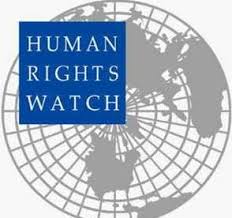Human Rights Watch is a nonprofit, nongovernmental human rights organization made up of roughly 400 staff members around the globe. Its staff consists of human rights professionals including country experts, lawyers, journalists, and academics of diverse backgrounds and nationalities. Established in 1978, Human Rights Watch is known for its accurate fact-finding, impartial reporting, effective use of media, and targeted advocacy, often in partnership with local human rights groups. Each year, Human Rights Watch publishes more than 100 reports and briefings on human rights conditions in some 90 countries, generating extensive coverage in local and international media. With the leverage this brings, Human Rights Watch meets with governments, the United Nations, regional groups like the African Union and the European Union, financial institutions, and corporations to press for changes in policy and practice that promote human rights and justice around the world.
MISSION STATEMENT
Human Rights Watch defends the rights of people worldwide. We scrupulously investigate abuses, expose the facts widely, and pressure those with power to respect rights and secure justice. Human Rights Watch is an independent, international organization that works as part of a vibrant movement to uphold human dignity and advance the cause of human rights for all.
CORE VALUES - WE ARE:
COMMITTED TO OUR MISSION OF DEFENDING HUMAN RIGHTS WORLDWIDE. Our work is guided by international human rights and humanitarian law and respect for the dignity of each human being.
INDEPENDENT. To ensure our independence, we do not accept government funds, directly or indirectly, or support from any private funder that could compromise our objectivity and independence. We do not embrace political causes, are non-partisan, and maintain neutrality in armed conflict.
FACTUAL, ACCURATE, AND ETHICAL IN OUR FACT-FINDING. We are committed to maintaining high standards of accuracy and fairness, including by seeking out multiple perspectives to develop an in- depth, analytic understanding of events. We recognize a particular responsibility for the victims and witnesses who have shared their experiences with us.
ACTIVELY FOCUSED ON IMPACT. We succeed only when our actions lead to positive and sustainable change. We are never complacent, always on the lookout for new opportunities to advance our cause. We also are committed to working on difficult situations, where long-term attention is required for meaningful impact.
SUPPORTIVE OF A DIVERSE AND VIBRANT INTERNATIONAL HUMAN RIGHTS MOVEMENT AND MUTUALLY BENEFICIAL PARTNERSHIPS. We work closely with a broad range of local and international civil society actors to maximize our impact. We speak out against attacks on civil society and defend the political space within which the broader human rights movement operates.
Members:
Resources
Displaying 1 - 5 of 20«Nous devons tout abandonner » Impact du barrage de Souapiti sur les communautés déplacées en Guinée
Le barrage de Souapiti, qui devrait à terme fournir 450 mégawatts après sa mise en service en septembre 2020, est le projet d’énergie hydraulique le plus avancé parmi plusieurs nouveaux projets planifiés par le gouvernement du président guinéen Alpha Condé. Le gouvernement guinéen estime que l’énergie hydraulique peut accroître considérablement l’accès à l’électricité, dans ce pays où seule une fraction de la population peut y accéder de façon fiable.
"We're Leaving Everything Behind"
Guinea’s 450 megawatt Souapiti dam, scheduled to begin operating in September 2020, is the most advanced of several new hydropower projects planned by the government of President Alpha Condé. Guinea’s government believes that hydropower can significantlyincrease access to electricity in a country where only a fraction of people have reliable access to power.
“What Do We Get Out of It?”
Bauxite mining in Guinea, one of the world’s poorest countries, is booming. Since 2015, the government of President Alpha Condé has transformed Guinea into a top global exporter, and the biggest to China, where the bulk of global aluminum is produced. Bauxite from Guinea now makes up a large proportion of the aluminum used across the world in car and airplane parts and consumer products like beverage cans and tin foil.
« Quels bénéfices en tirons-nous ? »
En Guinée, l’un des pays les plus pauvres du monde, l’exploitation de la bauxite est en plein essor. Depuis 2015, le gouvernement du président Alpha Condé a fait de la Guinée l’un des principaux exportateurs mondiaux, et le plus grand exportateur de ce minerai vers la Chine, le premier producteur mondial d’aluminium. La bauxite de Guinée représente désormais une large part de l’aluminium produit à l’échelle internationale et destiné aux pièces automobiles et aéronautiques ainsi qu’aux produits de consommation comme les canettes et le papier d’aluminium.
“You Will Get Nothing” Violations of Property and Inheritance Rights of Widows in Zimbabwe
Covers background, property grabbing from widows, legal standards on the rights of widows, recommendations. Includes the rights of older people, the invisibility of widows in global policy and development, harmful practices and widows in Zimbabwe, illustrative cases of property grabbing from widows, registration of marriages, widowhood and child marriage, the impact of property grabbing on widows’ lives, remedies.






